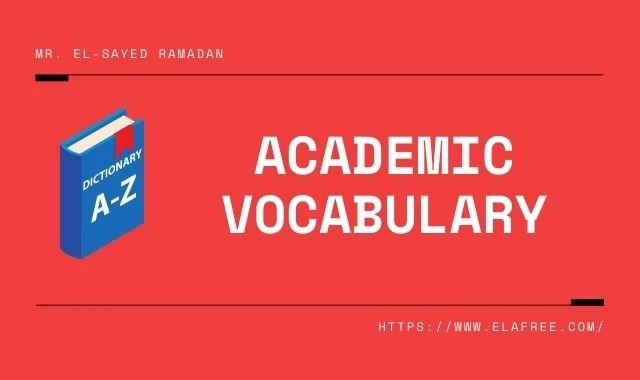Academic Vocabulary
Introduction
Academic Vocabulary plays a vital role in academic success. It involves using specialized words and phrases that are common in academic settings. By improving your academic vocabulary, you can enhance your writing and communication skills, which can lead to better grades and increased opportunities. In this blog post, we will provide an overview of academic vocabulary and discuss strategies for improving it. We will also include a quiz to test your knowledge and reinforce the concepts covered.
Learning Objectives
In this lesson, you will focus on the following objective: Understanding academic vocabulary.
Academic Vocabulary
What Is Academic Vocabulary?
Words that are commonly used in academic texts, such as textbooks, directions, and tests, are called academic vocabulary. Learning academic vocabulary is important because these words will help you read, write, and research in many academic areas. These words will also help you succeed on standardized tests.
Different Kinds of Words
Some words are specific to certain disciplines, or areas of study.
For example, the words alliteration, foreshadowing, and metaphor pertain to literature. Other words, such as concept, structure, and theory, are used in many areas of study. The charts below show more examples of both kinds of words.
Discipline-Specific Words
| Discipline | Words |
|---|---|
| Math | circumference, percentage, rectangle |
| Science | mitosis, chlorophyll, genus |
| Social Studies | confederation, federalism, antebellum |
$$
General Academic Vocabulary
| process | perceive |
| survey | relevant |
| research | interpret |
| indicate | tradition |
<->
Multiple-Meaning Words
Many academic vocabulary words, such as economy, have more than one meaning.
The first meaning is a literal, more common definition that you may be familiar with (economy means “the thrifty or efficient use of a material resource, such as money”).
The second definition is more academic and may be unfamiliar to you (economy also means “the efficient use of a nonmaterial resource, such as language”).
These two definitions are often related. In the case of economy, the two definitions are linked by the “efficient use of a resource.”
The chart below lists additional examples of academic words with more than one meaning.
The first meaning is a literal, more common definition that you may be familiar with (economy means “the thrifty or efficient use of a material resource, such as money”).
The second definition is more academic and may be unfamiliar to you (economy also means “the efficient use of a nonmaterial resource, such as language”).
These two definitions are often related. In the case of economy, the two definitions are linked by the “efficient use of a resource.”
The chart below lists additional examples of academic words with more than one meaning.
| Word | Definitions | Relationship |
|---|---|---|
| select | v. to choose adj. chosen because of excellence or preference | Both definitions involve choosing |
| range | n. the extent to which something varies v. to vary within specified limits | Both definitions involve variation within certain limits |
| conduct | n. a standard of personal behavior v. to lead from a position of power | Both definitions involve the correct way to do something |
Academic Vocabulary FAQs
Q1: What is academic vocabulary?
Academic vocabulary refers to words and phrases commonly used in educational settings, including schools and universities.
Q2: Why is academic vocabulary important?
It's vital for effective learning and communication in academic contexts. It helps students understand and express complex ideas.
Q3: What are some examples of academic vocabulary words?
Examples include "analyze," "evaluate," "hypothesis," "cite," "synthesize," and "summarize."
Q4: How can educators teach academic vocabulary effectively?
Strategies include explicit instruction, context-rich activities, and encouraging students to use these words in discussions and writing.
Q5: Can academic vocabulary vary across different subjects?
Yes, academic vocabulary can differ between subjects like science, mathematics, history, and language arts.
Q6: Are there resources to help students learn academic vocabulary?
Yes, educational books, flashcards, and online tools are available to enhance academic vocabulary skills.
Q7: What's the difference between academic vocabulary and everyday vocabulary?
Academic vocabulary is specialized and often more precise, while everyday vocabulary is used in everyday conversations.
Q8: How can students actively build their academic vocabulary?
Reading academic texts, participating in discussions, and practicing writing using academic words are effective ways.
Q9: Is academic vocabulary important beyond school?
Yes, it's valuable for success in higher education and many careers that require critical thinking and effective communication.
Q10: Can you provide examples of sentences using academic vocabulary?
Certainly, here's one: "The students were asked to analyze the data and formulate a hypothesis based on their findings."
References
- Coxhead, Averil. "A New Academic Word List." TESOL Quarterly, vol. 34, no. 2, 2000, pp. 213-238.
- Gardner, Dee, and Mark Davies. "A New Academic Vocabulary List." Applied Linguistics, vol. 35, no. 3, 2013, pp. 305–327.
- Hyland, Ken, and Polly Tse. "Metadiscourse in Academic Writing: A Reappraisal." Applied Linguistics, vol. 28, no. 2, 2007, pp. 156–177.

